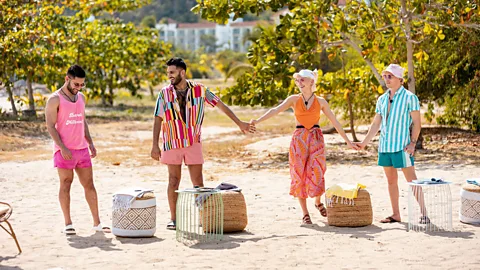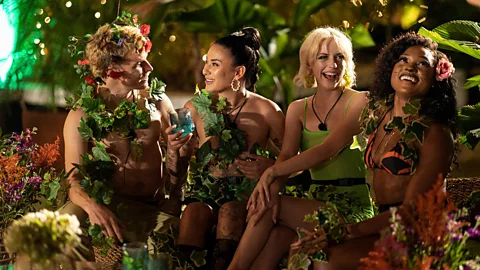What Couple to Throuple gets wrong about polyamory, according to the experts
 Paul Castillero/PEACOCK
Paul Castillero/PEACOCKThe show is among the first to represent polyamory to a mass audience. Relationship experts say the showrunners could have done better.
Combining a few attractive couples, a luxurious vacation on an island resort, an on-call sex and relationships expert, and triple-occupancy beds to share with a single of their choice certainly makes for successful reality TV. But experts say there is quite a lot that the Peacock original series Couple to Throuple has gotten wrong about polyamory.
The series follows the journey of four monogamous couples looking to explore polyamory for the first time. While this form of ethical non-monogamy typically involves each partner having multiple romantic and sexual relationships, each couple on the show only chooses one partner from a group of 14 singles – all of whom have had some experience in non-monogamy – with whom to form a "throuple". What ensues is a chaotic journey in which each throuple explores boundaries, jealousy, and ultimately decides if the lifestyle is right for them.
Other TV series and movies have lightly woven in themes of non-monogamy in recent years: Sense8 and Conversations With Friends both touch on it, for example. But Couple to Throuple is among the first to provide outright representation of polyamory. The series doesn't shy away from noting that adjusting to a new relationship structure can be difficult, and the stability of each couple's foundation is certainly put to the test. Some sex and relationship experts, however, feel that improvements could have been made to make the show more realistic and impactful for a mass audience.
 Paul Castillero/PEACOCK
Paul Castillero/PEACOCKEthical non-monogamy isn't one-size-fits-all, and that is especially true as it pertains to polyamory. In a 2023 poll, YouGov found that 34% of American couples prefer some form of non-monogamy in their ideal relationship. In a similar YouGov survey from 2023, 12% of adults in the UK said that they either have been, are in, or are open to, a polyamorous relationship. There are many ways such a significant amount of people can (and do) practice polyamory, which is something Couple to Throuple doesn't focus on.
According to sexologist and sex educator Goody Howard, a throuple dynamic, commonly referred to as a triad in polyamorous communities, may not have been the best structure for a TV series to represent ethical non-monogamy. That said, she feels Peacock went with it because of its monogamy-adjacent nature: "It's probably the easiest one for non-poly/monogamous people to understand," she says. But in reality, she explains, "there is no one way to be poly. Throuples often struggle with power dynamics and hierarchies more than some other poly structures."
In some cases, Howard continues, this hierarchy shows up as "couples privilege" – a concept known in polyamory wherein the original couple acts as the primary connection, often leaving the third partner in the triad at a disadvantage and putting them in a secondary position. If one partner from the pre-existing couple begins to feel jealous or insecure about their partner's relationship with the new person, couples privilege may kick in, and rigid boundaries could be put into place or the arrangement could end altogether.
Another issue experts noticed with Couple to Throuple was the immediacy with which the throuples engaged sexually. According to Elizabeth Sheff, one of the foremost researchers in polyamory, one common misconception about polyamory is that the primary focus is on having multiple sexual partners at the same time. In reality, many polyamorous prefer to date and form romantic connections in the same way monogamous people do.
In the series, when the couples arrived on the island, they were greeted with beds made for three people – and they wasted no time breaking them in. "While yes, it's a reality show and sensationalised for television, and there's a limited amount of time for the couples to get to know the third," says licensed clinical psychologist and sex therapist Karen Stewart. "I think that's why so many heightened feelings, jealousy, arguments and anger erupt. It was very apparent that a lot of the couples could not handle watching their partner touch or be physical with another… there were plenty of cringeworthy moments of obvious jealousy and anger."
One notable example is the discomfort experienced by Corey, a woman who forms a throuple with her partner Wilder and their third, Denise. She expresses finding it difficult to see Wilder being intimate with Denise, who finds himself enjoying the sexual attention of both women during a scene in the pool.
As Stewart explains, the amount of instant insecurity felt by the show's participants could have been prevented. Rather than jump into bed with the single they just met, the couples could have been given more time to connect and form trust and emotional intimacy with them. One way that some polycules – a group of people connected by a network of polyamorous relationships – do this is by choosing a dynamic that fosters mutual respect and trust, such as kitchen table polyamory.
What is kitchen table polyamory?
Kitchen table polyamory, or KTP, is a popular dynamic some polycules choose to foster. This dynamic looks like a community or even a chosen family, Stewart says. Everyone has some degree of involvement in each other's lives, and KTP usually encourages an environment of open communication and support.
In KTP, "multiple relationships are interconnected to form one larger unit, like a 'family', hence all sitting around a kitchen table like a family dinner," Stewart explains. "This does not mean that all partners or people in the relationships interact or are physical with each other, but they are operating as one unit." Some couples participating in KTP may find comfort in the fact that their partners all get along to some degree, and that there is a sense of shared transparency and respect.
This dynamic can sometimes exist inherently within a throuple, as long as couples privilege doesn't start to creep in. Achieving this can take a lot of work, explains Howard, especially in couples new to polyamory – so Couple to Throuple does the right thing by providing expert guidance from its resident sex and relationships expert Shamyra Howard (no relation).
"Having a professional guide the couples through the process is important. They're highlighting the unsexy side of poly," Howard says. "The processing, communication, and intimacy that the couples need to have before a throuple is even a thought. To me, intimacy is the culture of the relationship when they're not having sex. Vanilla folks just think it's all sex. That's swinging, not polyamory."
If you liked this story, sign up for The Essential List newsletter – a handpicked selection of features, videos and can't-miss news delivered to your inbox every Friday.
